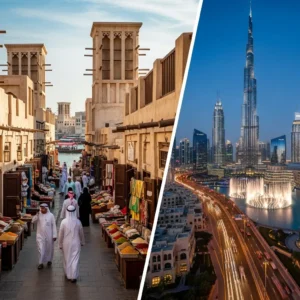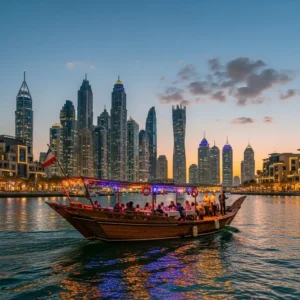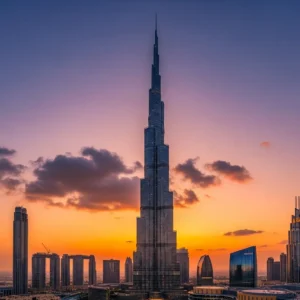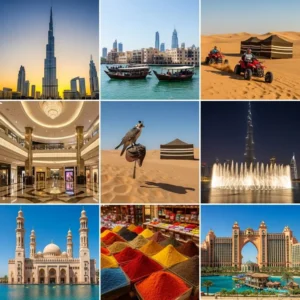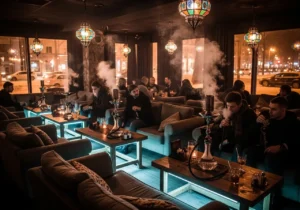Savor the City: A Dubai Food Guide for Every Palate
This Dubai Food Guide is your passport to one of the most dynamic culinary landscapes on the planet. Dubai’s identity is intrinsically linked to its food, a vibrant tapestry woven from the threads of countless cultures. The city’s meteoric rise from a quiet trading post to a global metropolis is mirrored in its dining scene, which offers an astonishing spectrum of flavors, from the humble, soul-satisfying fare of street-side cafeterias to the avant-garde creations of Michelin-starred chefs.
To eat in Dubai is to take a journey. In a single day, you can breakfast on flaky Lebanese manakish, lunch on aromatic Indian biryani, and dine on exquisite Japanese sushi, all while seated beneath the world’s tallest building. The city is a melting pot, and its kitchens are where this fusion truly comes to life. It’s a place where tradition and innovation coexist deliciously on the same plate.
Whether you’re a culinary adventurer seeking authentic local eats or a connoisseur in pursuit of unparalleled luxury, Dubai caters to every whim. This exploration will navigate you through bustling food alleys and into the most opulent dining rooms, proving that to truly know this city, you must first taste it.
The Heartbeat of the Streets: Uncovering Dubai’s Best Street Food
The soul of any great food city is found on its streets, and Dubai is no exception. The street food scene here is a vibrant, chaotic, and utterly delicious reflection of its multicultural population. It’s here, in the small, unassuming cafeterias and bustling neighborhoods, that you’ll find the authentic heartbeat of the city. This is the starting point for any true Dubai Food Guide.
This is food without pretense, served fast, fresh, and packed with flavor. It tells the story of the many expatriate communities—from India, Pakistan, the Philippines, Lebanon, and beyond—that have helped build the city. Exploring Dubai’s street food is not just about eating; it’s about experiencing the city’s grassroots culture.
Must-Try Street Food Dishes: The Flavors of Dubai
Dubai’s street food menu is a long and tempting one. To get you started, here are some of the quintessential dishes that you simply cannot miss.
Shawarma: The Undisputed King
The shawarma is the undisputed king of Dubai street food. This iconic wrap consists of tender, spit-roasted meat (usually chicken or lamb) that is shaved off, placed in a warm pita bread (khubz), and topped with garlic sauce (toum), pickles, and french fries. Every cafeteria has its own secret recipe, making the quest for the perfect shawarma a city-wide obsession.
Samosas and Vada Pav: An Indian Influence
Given the large Indian expatriate community, it’s no surprise that Indian snacks are a cornerstone of Dubai’s cheap eats. Crispy, golden samosas filled with spiced potatoes and vegetables are a ubiquitous treat. Equally popular is the Vada Pav, often called the “Indian burger,” which features a spiced potato fritter sandwiched in a soft bun with chutneys.
Manakish: The Arabic Pizza
Hailing from the Levant region, Manakish is a beloved flatbread that’s a staple for breakfast or a light snack. It can be topped with a variety of ingredients, but the most classic is a simple yet fragrant mix of za’atar (a thyme and sesame seed blend) and olive oil. Other popular toppings include cheese (akkawi) and minced meat.
Luqaimat: A Sweet Emirati Tradition
For those with a sweet tooth, Luqaimat is a must-try. These are small, deep-fried dumplings, similar to doughnuts, that are crispy on the outside and soft and airy on the inside. They are traditionally drizzled with date syrup (dibs) and sprinkled with sesame seeds, offering a delightful taste of authentic Emirati hospitality.
Karak Chai: The City’s Favorite Brew
You haven’t truly experienced Dubai until you’ve had a steaming cup of karak chai. This strong, milky tea is infused with cardamom and other spices, creating a fragrant and comforting brew. It’s more than just a drink; it’s a social ritual. You’ll see locals and expats alike pulling up to cafeterias to get their one-dirham cup of “karak.”
Key Street Food Neighborhoods to Explore
To find the best street food, you need to know where to look. Venture away from the tourist hubs and into these vibrant neighborhoods. This part of our Dubai Food Guide focuses on location.
2nd December Street (formerly Al Dhiyafah)
This long, bustling street in Satwa is a legendary destination for street food connoisseurs. It’s lined with old-school cafeterias and small restaurants that have been serving the community for decades. This is one of the best places to find incredible shawarmas, fresh fruit juices, and a lively atmosphere that spills out onto the pavement.
Al Karama: A Taste of India
Al Karama is a bustling residential and commercial district famous for its incredible concentration of authentic Indian and Pakistani restaurants. This is the place to go for rich curries, succulent kebabs, and a mind-boggling variety of regional Indian dishes. The area is a paradise for budget-conscious foodies.
Deira and Bur Dubai: The Historic Heart
The areas surrounding the Dubai Creek are the city’s historic heart and home to some of its oldest and most authentic eateries. Near the bustling souks, you can find small, family-run restaurants serving traditional Emirati and South Asian food. Grabbing a quick, delicious bite here is the perfect way to refuel while exploring Old Dubai.
A Symphony of Taste: The World of Fine Dining in Dubai
At the other end of the culinary spectrum lies Dubai’s extraordinary fine dining scene. This is a world of breathtaking settings, celebrity chefs, and Michelin stars. The city has aggressively pursued its ambition to become a global gourmet destination, and it has succeeded spectacularly. It is a critical component of any complete Dubai Food Guide.
Luxury dining in Dubai is about the entire experience. It’s about innovative cuisine, impeccable service, and dramatic, unforgettable locations—from the top of the world’s tallest building to the bottom of its largest aquarium.
Iconic Fine Dining Restaurants You Can’t Miss
While new restaurants open every week, a few iconic establishments have set the standard for luxury dining in the city.
Pierchic: Romance Over the Water
Perched on its own private pier jutting out into the Arabian Gulf, Pierchic offers one of the most romantic dining settings in Dubai. With uninterrupted views of the Burj Al Arab, it specializes in exquisitely prepared seafood. The sound of the waves and the stunning vistas create a magical ambiance that is perfect for special occasions.
Ossiano: An Underwater Culinary Journey
Located in Atlantis, The Palm, Ossiano provides a truly surreal dining experience. The restaurant is set against the backdrop of the resort’s massive Ambassador Lagoon aquarium. Diners can watch sharks, rays, and thousands of fish glide by as they enjoy progressive Mediterranean cuisine. It’s an immersive, multisensory adventure.
At.mosphere: Dining Among the Clouds
Situated on the 122nd floor of the Burj Khalifa, At.mosphere holds the record for being the highest restaurant from ground level. The views are, as expected, absolutely breathtaking. The restaurant offers a sophisticated menu of modern European cuisine, making a meal here a literal high point of any trip to Dubai.
Trèsind Studio: An Indian Masterpiece
Trèsind Studio has redefined Indian fine dining not just in Dubai, but globally. It offers an intimate and exclusive experience, seating only a small number of guests per night for an elaborate tasting menu. The chefs showcase the future of Indian food with creative, artistic, and mind-bendingly delicious dishes.
The Rise of Celebrity Chefs in Dubai
Dubai’s fine dining reputation has been significantly bolstered by the influx of world-renowned celebrity chefs. Culinary titans have flocked to the city to open outposts of their famous restaurants, adding their star power to the scene. For other exciting tours and activities, you can see options at https://hafiztourism.com/.
Chefs like Gordon Ramsay, Yannick Alléno, and the late Gary Rhodes have all established a strong presence in Dubai. Their restaurants, often located in the city’s top luxury hotels, offer diners a chance to experience world-class cuisine without having to travel to London, Paris, or New York.
Emirati Cuisine: Discovering the Local Flavor
No Dubai Food Guide would be complete without a deep dive into the host culture’s own cuisine. For a long time, authentic Emirati food was hard to find, often confined to private homes. Thankfully, a recent cultural revival has brought it to the forefront, with several excellent restaurants now dedicated to preserving and celebrating the nation’s culinary heritage.
Emirati cuisine is subtle, aromatic, and comforting. It reflects the region’s history, with influences from Bedouin, Persian, and Indian cooking traditions. Key ingredients include rice, wheat, and meat (like lamb and chicken), with a focus on fragrant spices like cardamom, saffron, and turmeric.
Traditional Emirati Dishes to Seek Out
- Al Machboos: This is one of the most popular national dishes. It’s a flavor-packed rice dish (similar to a biryani) made with meat or fish that has been cooked in a broth of aromatic spices, including dried limes (loomi).
- Al Harees: This is a simple but incredibly wholesome and delicious dish with a porridge-like consistency. It’s made from wheat and meat, slow-cooked for hours until the ingredients are completely blended. It’s often served during special occasions.
- Camel Meat: While it might sound exotic, camel has been a part of the Bedouin diet for centuries. It’s a lean, flavorful meat often served either as tender sliders in a burger or as part of a traditional rice dish.
Where to Experience Authentic Emirati Food
For a truly authentic experience, visit restaurants like Al Fanar Restaurant & Cafe, which is designed to transport you back to 1960s Dubai. Another excellent option is Siraj in Souk Al Bahar, which offers Emirati cuisine with a contemporary Levantine twist. Exploring these local flavors is a journey in itself, just as a desert trip from https://royaldesertadventures.ae/ can be.
Dubai Food Guide: A Head-to-Head Comparison
To help you navigate your culinary choices, here’s a simple comparison between the city’s two distinct dining worlds.
Planning Your Culinary Journey: Tips for Food Lovers
To make the most of your eating adventures in Dubai, keep a few practical tips in mind. This is a crucial section in this Dubai Food Guide.
- Food Festivals: Plan your visit around the Dubai Food Festival (usually held in February/March). The city comes alive with pop-up beach canteens, special tasting menus, and culinary events.
- Reservations: For fine dining restaurants, especially the popular ones, booking a table well in advance is essential. Some iconic venues are booked out weeks or even months ahead.
- Brunch Culture: Don’t miss the legendary Dubai Friday brunch. It’s an all-you-can-eat-and-drink extravaganza offered by most hotels and high-end restaurants, representing a major part of the city’s social life.
- Cultural Etiquette: Tipping is appreciated but not mandatory; 10-15% is standard if a service charge isn’t already included. During Ramadan, be aware that eating and drinking in public during fasting hours is prohibited.
Conclusion
Dubai’s culinary scene is a perfect metaphor for the city itself: a dazzling fusion of tradition and hyper-modernity. It’s a place where you can find profound satisfaction in a simple, one-dollar cup of karak chai and, just a few miles away, have your perceptions of food completely transformed by a 20-course avant-garde meal.
This Dubai Food Guide is merely an introduction. The true joy lies in the discovery—in wandering off the beaten path to find a hidden gem in Deira, or in splurging on that once-in-a-lifetime meal with an unforgettable view. To eat your way through Dubai is to experience the story of the world, one delicious bite at a time. For other city tours and experiences, you can explore options from https://dubaidesertsafarie.com/.
Frequently Asked Questions (FAQs)
1. What is a must-try dish for a first-time visitor to Dubai? For a first-time visitor, the absolute must-try dish is a classic shawarma. It’s the quintessential Dubai street food and embodies the city’s Middle Eastern flavors. Find a busy, popular cafeteria—the locals know best—and order a chicken shawarma with extra garlic sauce. It’s a delicious, affordable, and authentic taste of the city’s everyday life that perfectly kicks off any culinary exploration.
2. Is it expensive to eat in Dubai? Dubai has a reputation for being expensive, but this only applies if you exclusively visit high-end establishments. It can also be one of the most budget-friendly food cities in the world. You can have an incredibly satisfying and delicious meal at a street-side cafeteria or a restaurant in Al Karama or Deira for under $10. The city truly caters to every possible budget.
3. What is “brunch” in Dubai, and should I try it? Friday brunch in Dubai is a cultural institution. It’s not the simple breakfast-lunch hybrid you might know. It’s a lavish, all-inclusive buffet, typically running for four hours, with unlimited food and beverages. Most hotels and high-end restaurants offer it, each with a different theme or cuisine. If your budget allows, you should absolutely try it for a taste of the exuberant Dubai lifestyle.
4. Are there options for vegetarians and vegans in Dubai? Yes, Dubai is extremely vegetarian and vegan-friendly. Due to the huge South Asian population, there is an abundance of incredible vegetarian Indian restaurants. Middle Eastern cuisine also features many vegetarian dishes like hummus, falafel, and tabbouleh. Most fine dining restaurants now offer dedicated vegetarian and vegan menus as well.
5. What is Emirati cuisine like, and is it spicy? Emirati cuisine is generally not very spicy in terms of heat. Its flavors are more aromatic and fragrant, derived from spices like saffron, cardamom, turmeric, and dried limes. The dishes are hearty and comforting, with a focus on slow-cooked meats, rice, and wheat. It’s a subtle and rich culinary tradition that is well worth exploring.
6. Do I need to make reservations for restaurants? For casual street food places and mid-range restaurants, you can usually just walk in. However, for fine dining restaurants, popular brunch spots, or any restaurant located in a major attraction like the Burj Khalifa or Atlantis, making a reservation is essential, often weeks in advance, especially for a weekend table.
7. Can I drink alcohol in Dubai? Alcohol is available in licensed venues, which are almost always located within hotels or specific free zones. You cannot buy alcohol in supermarkets (unless you are a resident with a liquor license) and it is strictly illegal to drink in public or be publicly intoxicated. The legal drinking age is 21.
8. What should I know about dining during Ramadan? During the holy month of Ramadan, Muslims fast from sunrise to sunset. Out of respect, eating, drinking, and smoking in public are prohibited for everyone during these hours. Many restaurants will be closed during the day. However, restaurants in hotels often remain open behind screens, and food courts in malls have designated dining areas. After sunset, the city comes alive with Iftar, the breaking of the fast, featuring lavish buffets.
9. Is tipping customary in Dubai restaurants? While not mandatory, tipping is a common practice and is always appreciated for good service. A tip of 10-15% is a standard guideline. Some restaurants automatically add a service charge to the bill, in which case an additional tip is not necessary unless the service was exceptional. For small cafes or food delivery, rounding up the bill or leaving a small amount is customary.
10. What are food delivery services like in Dubai? Dubai has a highly efficient and extensive food delivery network. Apps like Talabat, Deliveroo, and Careem NOW are incredibly popular and cover almost every restaurant in the city, from fast food chains to high-end eateries. You can get almost anything delivered to your hotel or apartment, often 24/7, making it a very convenient option for dining in.
11. Is the water safe to drink in Dubai? Yes, the tap water in Dubai is perfectly safe to drink as it is desalinated and meets strict quality standards. However, due to the taste, which can be different from what people are used to, and the hot climate, most residents and tourists prefer to drink bottled water, which is widely available and inexpensive.
12. Are there food tours available in Dubai? Yes, there are excellent food tours that offer a fantastic way to explore the city’s culinary scene, especially its street food. Companies like Frying Pan Adventures run highly-rated walking tours through Old Dubai, allowing you to sample a wide variety of authentic dishes while learning about the city’s history and culture from a local guide.
13. What is the difference between Arabic coffee and Turkish coffee? Arabic coffee (gahwa) is a cornerstone of Emirati hospitality. It is a light-colored coffee made from lightly roasted beans and infused with cardamom and sometimes saffron. It is served in small, handleless cups and is typically unsweetened. Turkish coffee is made from finely ground, dark roasted beans, boiled in a special pot called a cezve, and is served thick and strong, often sweetened.
14. Can I find international fast-food chains in Dubai? Yes, virtually every major international fast-food chain is present in Dubai, from McDonald’s and KFC to Shake Shack and Five Guys. You will find them in every mall food court and as standalone outlets throughout the city. They offer a familiar taste for those looking for a quick and easy meal.
15. What are the best dishes to try at an Iftar buffet during Ramadan? An Iftar buffet is a massive feast. Traditionally, the fast is broken with dates and water. After that, you should look for classic Ramadan dishes like lentil soup, Harees (a wheat and meat porridge), and Machboos (spiced rice and meat). You will also find a huge variety of hot and cold mezze, grilled meats, and a vast dessert section, often featuring Luqaimat and Umm Ali (an Egyptian bread pudding).

